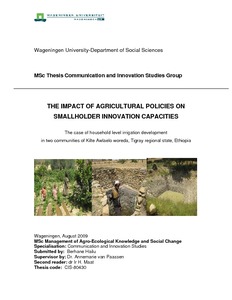Resource information
Agricultural production in Ethiopia is characterised by subsistence orientation, low productivity, low level of technology and inputs, lack of infrastructures and market institutions, and extremely vulnerable to rainfall variability. It has a rapidly increasing population currently close to 74 million and yet about 39 percent of the population lives on absolute poverty of less than a $1 a day poverty line while close to 80 percent falls below US $2 a day poverty line. The government of Ethiopia has formulated policies and strategies to guide over all development with focus to rural and agricultural development. The agricultural strategy emphasizes commercializing subsistence agriculture through capacity building of various actors, development and adoption of high yielding technologies, diversification of high value commodities, and sustainable use of natural resources. Irrigation development is one of the major pillars of the rural development strategy. In more recent years, the priority of irrigation development has shifted from large-scale approaches to smallscale and household level interventions. This research was conducted in two communities of Kilte Awalelo district, in Tigray regional state where household level irrigation intervention has been introduced at a massive-scale aiming at achieving food security and poverty alleviation among the rural poor. The research has investigated the impact of agricultural policies on innovation capacities of smallholders in the case of household level irrigation. Data was collected using qualitative methods which incorporated semi-structured interviews, focus group discussions and opinions of key informants. The main findings of the research indicate that irrigation promotion has expanded in terms of area and number of beneficiaries after a change in strategy from largescale to household level. However, the policy is dominated by top-down approaches reflected in highly centralised planning and blanket intervention processes. These approaches have highly affected the innovation capacity of smallholders which led to the failures of the household level irrigation interventions. The study findings indicate that attitudinal problems are the major factors for the top-down policy practices. Investigations on community responses to top-down policy interventions have shown that while majority community areas attempt to implement policy strategies without making significant adaptations, few communities respond in a creative way and attempt to develop local level innovations to address their demands. According to the research findings, the key factor for such differences is attributed to the competences and commitments of local level leadership. However, it was found that local level innovations are negatively affected by the top-down macro-policy hence innovation enabling environment both at local and macrolevel is key to the success of innovation capacity. The research suggests the need to introduce new way of policy intervention that takes into consideration the contemporary context for agriculture and innovation thinking approach.



